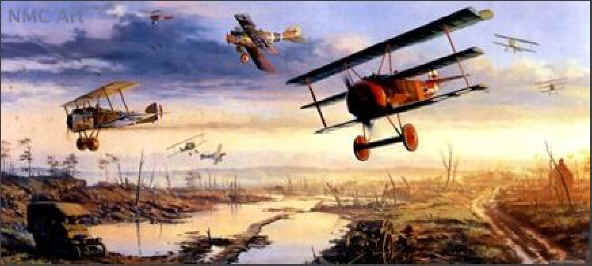|
|
| Fokker |
|

|
Herman
Gerard Fokker was born in 1890, at Kediri Java, the son of a Dutch tea
planter. He returned to Holland with his family in 1894. He
was a poor student, but had great native genius and inventiveness.
He only made it through his high school exams by means of a self
invented crabbing-machine. He went to Germany to train in a car
manufacturing school but his interests quickly diverted to a newly
started course in aviation. The one plane he and his class built was
crashed by a pilot that couldn't fly and the course was
terminated. Fokker didn't give up. He wrangled some money
from his father and built his own plane and taught himself how to
fly. That was in 1910. He was only twenty years old. In the
best tradition of the American barn-stormers, he began making a living
by giving demonstrations and taking people for joy rides. It
gained him the title of "The Flying Dutchman" Two
years later, he produced what was believed to be the fastest,
most stable aircraft in the world and established
a small aircraft factory at Johannisthal near Berlin.
When
World War I broke out, he put his skills to use for the Germans.
He produced more than sixty distinct aircraft designs during this
period. The great German aces of the war - Voss, Immelmann, Boelke, and
Richtoffen - achieved their outstanding records with the help of the
"Fokker." He accomplishments including the Fokker
D-VII, which was probably the best fighter of the war and the DR-1
tri-plane fighter made famous by the Red Baron (shown above).
His Eindecker was the first
monowing airplane in the war. He developed the machine gun
synchronizer in just 48 hours after being given the assignment.
After the war the Dutch government hesitated to
buy his aircraft, so he sold the salvaged German surplus war production
to Russia and emigrated to the United States. In
1922 he established the Atlantic Aircraft Corp. in New Jersey, but also
maintained a large aircraft factory in The Netherlands. He sold many
planes to the U.S. military, and the U.S. Air Corp's Fokker T-2
made the first nonstop transcontinental flight across the United States,
flying from New York to San Diego. In 1925, Fokker Introduced his famous
F-VII Tri-motor and it became the world's most widely used passenger
plane. Richard Byrd and Floyd Bennett used
one to fly over the North Pole in 1926.
The all-metal Douglas DC1 of 1933 meant
an end to the Fokker supremacy. A last brilliant stroke was
the beautiful twin-tailed G-1 fighter of 1936, nicknamed the
Reaper. Fokker died in America in 1939. His
autobiography, The Flying Dutchman, was published in 1931.
In 1970, he was invested in the International Aerospace
Hall of Fame. The
company went bankrupt in 1996. We are proud to present models of
two Fokker Passenger Planes. |
|
F-VII
Tri-motor | F-100
Jetliner |
|
Fokker's
great planes of World War I include: |
|
Fokker
D-VII | DR-1
tri-plane fighter |
Eindecker |
|
